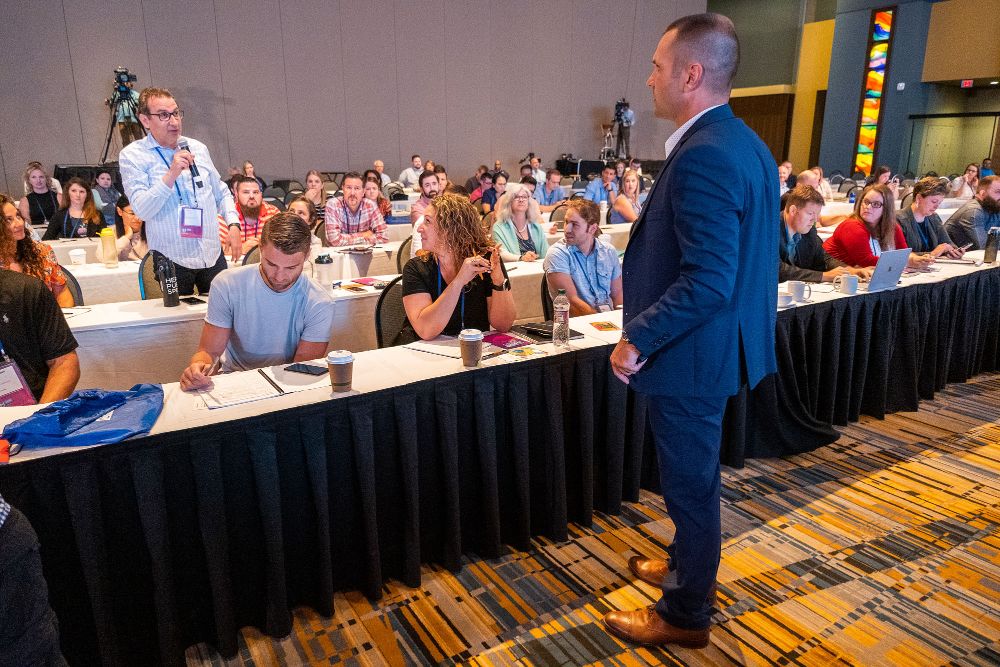Subscribe now and get the latest podcast releases delivered straight to your inbox.
What Short-Term Wins Can We Expect With They Ask, You Answer?

Mar 15, 2022

In modern business, there’s so much focus on short-term successes (are we meeting our goals for this month? For this quarter?) that undertaking an initiative that unfolds more slowly can require a leap of faith.
At IMPACT, we guide clients to use our They Ask, You Answer framework, developed by partner Marcus Sheridan when his pool business faced closure during the Great Recession.
With a bleak future on the horizon, Marcus began to openly and honestly answer any customer question he had ever heard. These answers were posted on his company website and, in time, began driving thousands of visitors to his site.
Today, IMPACT helps businesses do the same thing Marcus did: shift their marketing focus to answer customer questions. In doing so, they become an educational resource for their industry. But, as anyone on business knows, building trust doesn’t happen overnight.
We often share real-world results from clients that show how far they’ve come, but these often depict a year or two of hard work building an inbound marketing program.
But what about a shorter timeline?
For businesses that are seriously considering embarking on a They Ask, You Answer journey, there can that one central worry: So, when will I start seeing results?
In this article, we’ll explain what your first few months look like as an all-in They Ask, You Answer company. Including:
- Getting started with They Ask, You Answer
- They Ask, You Answer at 90 days
- They Ask, You Answer at 180 days
- Common pitfalls to avoid
Let’s dive in so you can start imagining your future.
What does it mean to get started with They Ask, You Answer?
Devon McCarty, a digital sales and marketing coach at IMPACT, has worked with numerous businesses that have aggressively pursued They Ask, You Answer, and he can offer a vantage point of their progress.
So, how quickly can you start seeing results from They Ask, You Answer? It won’t happen overnight, but it can happen fairly quickly, especially if you’re willing to go all in.
The first step is catching the vision
In an abstract sense, the They Ask, You Answer journey begins in the mind of a business leader. According to Devon, “They Ask, You Answer starts with a ‘Wow’ moment. When you realize that you don't have to do things the way everyone else is doing it.”
In many cases, a business leader might hear Marcus speak at a conference, or they might pick up a copy of the They Ask, You Answer book.

(image credit: Seshu from connecticutheadshots.com)
But even if a business leader is enthusiastic about Marcus’s message, they might not know exactly how to get started.
“They know [They Ask, You Answer] worked for the pool guy,” says Devon. “They know it worked for the case studies in the book. And they sincerely do want to take ownership of their digital sales and marketing, but they’re just not sure how.”
In this situation, there are two possible paths toward failure:
- A company will never really move forward, not knowing exactly how to begin or who should own the initiative.
- A single business leader will try to go from 0-60, speeding ahead without a clear plan, only to meet resistance and confusion in coworkers, leading to frustration and abandonment.
In order to experience They Ask, You Answer success, you need to understand the framework and you need to build consensus.
Next, you need company-wide buy-in
They Ask, You Answer works best when the company leadership, marketing, and sales are all on board for the initiative.
Devon had a client in which only the marketing leader had bought into They Ask, You Answer, and no one else in the company had any idea it would be implemented into their organization, which was leading to miscommunication and frustration.
Here’s the truth. They Ask, You Answer is a sales and marketing framework that flourishes when everyone is on board. If you’ve caught the bug, make sure that other stakeholders at your organization share your vision. Without this shared outlook, the initiative will not move forward smoothly.
(By the way, if you’re interested in running a They Ask, You Answer book club at your organization, you can use this guide.)
Then you’re ready to hire a content manager
Your company will need a writer.
A key component of They Ask, You Answer is taking the process of content production in-house. In order to do this, companies should hire a content manager who can write blog articles, interview subject matter experts, and work with the sales team to turn buyer questions into content.
The hiring of a content manager can occur in as little as two weeks. However, if your interview process involves simulated tasks and other requirements, it might take a bit longer.
That said, Devon has definitely “seen companies that landed a great content manager within two weeks of posting their job offer.”
Once that person is in place, Marcus suggests having them start writing immediately:
“Content managers should start producing written work in the first week. In fact, the best onboarding is interviewing staff and asking them questions about the products and services that you sell.”
Soon after your content manager, you should consider hiring a videographer. Producing video content is just as crucial, and creating a “culture of video” will get your team comfortable being on camera.
Once you’ve gotten buy-in and hired your content producers, you’ve reached day one of your They Ask, You Answer journey.
Here’s what to expect in the next few months.
They Ask, You Answer at 90 days
At 90 days, look how far you’ve come!
A better sales process
In 90 days, you can expect to see real improvement in your sales process.
This use of “assignment selling” allows a sales team to anticipate each question a prospect will ask — and answer it with a piece of content that’s been produced by the content manager. As a result, prospects are more educated and informed going into each sales call. Not only does this leave the buyer with fewer questions, but it also builds trust with your company.
Close rates go up, and the sales cycle gets shorter.
This process brings the marketing and sales teams together.
“When organizations refine and standardize their sales process to include educational content, they’re able to shorten the sales cycle,” says Devon. “This starts to happen well before 90 days.”
Organic traffic growth
While each client is different, they generally see significant organic traffic growth within 90 days. Devon describes one of his clients that is 90 days into their journey. Their organic web traffic has exploded: “They’ve doubled their keyword growth in every category, and some have tripled.” In Devon’s words, “Their commitment to writing and publishing quality content, at least three articles a week, is starting to really show results.”
What’s been key, says Devon, is having a content manager on staff, and working with IMPACT content coaches on search engine optimization and publication cadence.
More and better leads
As their traffic increases, businesses begin to build conversion paths to capture leads that can be transferred to their sales team.
They Ask, You Answer at 180 days
At six months, your They Ask, You Answer journey should really be gathering steam. As Devon puts it, “the snowball is built, and you’re ready to start rolling down the mountain.”
All this time, you've been building a culture and establishing momentum. Now is when things really take off.
You’re seeing more traffic, better leads, and quicker sales.
A culture of content creation
Successful They Ask, You Answer companies build a culture of content creation by regularly publishing content that both draws traffic and shortens the sales cycle.
At the 180 day point, your sales team and marketing team are working closely together. (Ideally, they have combined into a single revenue team.)
All stakeholders understand exactly what is being written and when, and how it can be used in the sales process once it’s published.
Content wins are celebrated company-wide.
Strategic planning and detailed reporting
Regular planning sessions ensure alignment and strategic direction.
At this point, the organization is adept at using HubSpot to track how visitors are interacting with the content, which helps inform future strategy.
Businesses also use HubSpot to track sales pipelines, automate email nurture campaigns, and serve up smart content to site visitors.
At 180 days, the They Ask, You Answer principles feel like second nature, and the culture of your business will have adapted to this new mindset.
Shortcuts to avoid
These details above represent possibilities. Not every company gets here in 90 or 180 days. Some try to take shortcuts, and their results are diminished accordingly.
- A common shortcut Devon sees with clients is a hesitancy to hire a content manager. Trying, instead, to have someone already on your team handle your content production will not be successful. Content management is a full-time job, and if you add it as “one more thing” to somebody’s list of responsibilities, it won’t get done properly.
- Another common shortcut to avoid is not making the effort to align your sales and marketing teams. While no one is a fan of extra meetings, you need these teams to have common planning time if you want them to be working seamlessly together. Trust-based relationships do not just happen. You need to set aside time for team building and alignment. Set a time — at least an hour every other week — that allows this alignment to happen. Be sure that this is a purposeful meeting, not a waste of time. These meetings should be dynamic, interactive, and engaging. Put the time in everyone’s calendar to make alignment a reality.
They Ask, You Answer is a proven framework that’s been used by thousands of businesses.
When you follow the steps and go all in, you can revolutionize your business. If you take shortcuts, you won’t see the same results.
Getting started on your They Ask, You Answer journey
The story of Marcus Sheridan saving his pool business by answering customer questions — and thereby creating the They Ask, You Answer framework — has taken on nearly mythic proportions for many who read his book. As with any myth, it’s best to do away with any “happily ever after” endings.
They Ask, You Answer did not save Marcus’ business overnight, and it certainly wasn’t easy. But today, River Pools remains the most highly-trafficked pool website in the world.
As you begin your They Ask, You Answer journey, remember that it is a commitment to a new approach to sales and marketing. With buy-in and with the right people in the right seats, you can progress quickly — as long as you commit and hold your team accountable.
In three months, you’ll be well on your way. By six months, these processes will become habitual and you’ll have true momentum. From there, the results can be amazing. Keep moving towards that goal!


Order Your Copy of Marcus Sheridan's New Book — Endless Customers!